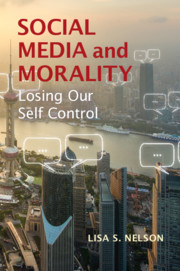Book contents
- Frontmatter
- Contents
- Introduction
- 1 The Political Significance of Social Media and the Limits of Our Understanding
- 2 The Moral Significance of Social Networking Technologies
- 3 Why We Do What We Do
- 4 Time Consciousness and the Specious Present of Social Media
- 5 Pretty Is as Pretty Does
- 6 Revealing the Moral Self in the Context of Us
- Bibliography
- Index
4 - Time Consciousness and the Specious Present of Social Media
Published online by Cambridge University Press: 07 June 2018
- Frontmatter
- Contents
- Introduction
- 1 The Political Significance of Social Media and the Limits of Our Understanding
- 2 The Moral Significance of Social Networking Technologies
- 3 Why We Do What We Do
- 4 Time Consciousness and the Specious Present of Social Media
- 5 Pretty Is as Pretty Does
- 6 Revealing the Moral Self in the Context of Us
- Bibliography
- Index
Summary
John and Kelly Halligan lost their thirteen year old son, Ryan, to suicide on October 7, 2003. At the time of his death, Ryan was a student at a middle school in Essex Junction, Vermont. After Ryan's death, it was revealed that he was ridiculed and humiliated by peers at school and on- line. Ryan father writes: “A few days after his funeral I logged on to his AOL IM account because that was the one place he spent most of his time during the last few months. I logged on to see if there were any clues to his final action. It was in that safe world of being somewhat anonymous that several of his classmates told me of the bullying and cyber bullying that took place during the months that led up to his suicide. The boy that had bullied him since 5th grade and briefly befriended Ryan after the brawl was the main culprit. My son the comedian told his new friend something embarrassing and funny that happened once and the friend (bully) ran with the new information that Ryan had something done to him and therefore Ryan must be gay. The rumor and taunting continued beyond that school day … well into the night and during the summer of 2003” (Halligan, n.d.).
The Importance of Time
Did the schoolmates of Ryan anticipate their instant messages would lead to his suicide, and does the asynchricity of time when we are online have anything to do with it? The central question considered in this chapter is whether the phenomenological effects of social networking technologies alter our sense of time consciousness and, in doing so, influence the moral quality of our actions and decisions and ultimately who we are online. Time consciousness and moral judgment are inextricably linked. Moral responsibility is a function of contemplation of our actions, not temporally isolated in the present, but in consideration of the effect of our decisions and actions on others with a view toward the past and future. In short, freedom and responsibility for our actions depend on the structure of temporality because it forces us to consider a longer perspective on our existence and our responsibility to humankind.
- Type
- Chapter
- Information
- Social Media and MoralityLosing our Self Control, pp. 122 - 154Publisher: Cambridge University PressPrint publication year: 2018



